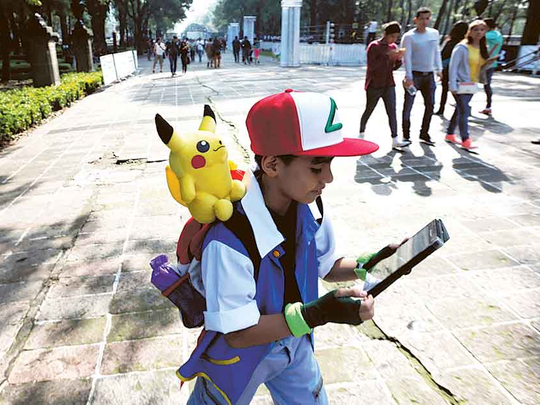
Is ganging up with friends and chasing monsters in Pokémon Go loads of fun, or a chore similar to doing homework? We’re pretty sure most children will tell you what a great time they had playing the game and scoring more points than their friends, even if it meant going on long Poké walks and sweating it out.
Augmented Reality (AR) games such as Pokémon Go have a major advantage over the Candy Crushes and Angry Birds of the world — they make you step out and move around. In fact, a March 2016 report from consultancy firm PSFK Labs claims that despite the buzz around virtual reality, it is its sister technology — AR — that is poised to “take over 2016”. Unlike VR, AR does not block you out of your physical environment and can be smartly leveraged to enhance real-world activities — from gaming to exercising. Or even fusing the two in a grand mash-up of fun that keeps you fit.
Katrina Mankani, Head of Education in Human Values at Regent International School and Sunmarke School, feels AR games highlight where we are today in terms of redefining social and physical activity. “It’s not the same as going out for a bike ride on the same route every afternoon because the games keep changing,” she points out. And at school, AR games encourage social interaction between students, since they are all usually playing the same games at home. “We encourage students to support each other when they identify a common goal, especially if it is a game. This is healthy sportsmanship and we value this just as much as musical or mathematical skills.”
Stimulating the imagination
Sarah James, Club General Manager at TribeFit, Dubai Marina, also firmly supports the idea of encouraging movement and activity through gaming. She notes AR games keep players interested through varied themes and levels. “We all need new and interesting ways to keep fit. Otherwise we fall into a rut and lose motivation. This is human nature,” says James, adding that AR games also stimulate the imagination, so it is a kind of brain exercise at the same time. “AR Fitness is what we need today in times where obesity and diabetes are at an all-time high. Children play virtual football and call it sports!”
Devika Singh, a licensed psychologist and learning enrichment specialist based in Dubai, believes that by letting users control and modify aspects of the physical world, AR games enhance cognitive stimulation by encouraging planning, critical thinking and sequential processing. “Many users report great motivation to get up and venture out to their Pokéstops and end up increasing their physical activity and social interaction with other gamers.”
Meanwhile, Judhi Prasetyo, Chief Technologist at his own company in Dubai, and a father of two, plays Pokémon Go for an hour daily. This adds around half a kilometre to his existing walk routine. But more than fitness, Prasetyo feels such AR games can bring players closer: “I found [Pokémon Go] is good for bonding between parents and children when played together.”
But safety first. James points out this is the most critical factor with AR games. “When children are exposed to the outside world, even if it is through technology, we have to make sure we are filtering out people or information that isn’t appropriate for them. It is also absolutely critical to ensure children don’t overdo it and neglect other areas of their lives.” She advises AR games should be part of a repertoire of activities and not the sole source of fitness or movement — “Encourage games such as Pokémon Go as a way to make fitness and movement fun so that children make it a part of their lives. But don’t rely on electronic games to stay fit.”
Supervision still matters
Singh agrees. As with any child-centred activity, supervision and feedback are critical. “Children can get carried away with games and activities and lose a sense of balance,” she says. “Parents must be involved enough to know where this line is and help children maintain that balance.” Moreover, regular feedback will help children differentiate between fantasy and reality, which is “not always easy for young minds”.
And while healthy competition is great and that’s one of the reasons socially integrative games are a good idea, some children can get drawn into the competition in ways that create distress and affect functioning. “Remind children that while winning is always a goal, it’s not guaranteed,” she adds. “Enjoy the process of getting out, seeing things for yourself and get a team together to get even further. Two or five heads are always better than one.”
Meanwhile, Mankani’s advice to young gamers is to stop, think and be mindful of whether they are practising their value-based education in everyday activities. “Ask yourself, are you practising perseverance, patience, truthfulness, fairness even as you play Pokémon?” And her suggestion to parents: “Get in there with them and in doing so help them find a holistic balance between the different areas of their lives.”
The hunt starts here
The Dubai Pokémon Go fan page on Facebook went online on July 10 and has already garnered more than 5,500 likes. Its creator, who wishes to remain anonymous, estimates active players in the city to be in the thousands. You will typically see them in groups of up to five on poké walks. With the weather still hot, most are flocking to malls — Dubai Mall, Mall of the Emirates and Ibn Battuta have emerged as prime hunting grounds. A player who has been at it longer than most is Jad Hindy, Regional Head of Innovations at ad agency FP7. He played Ingress — an earlier AR title from Pokémon Go developer Niantic Labs — for a couple of years. Hindy recommends players do an early morning poké walk on Jumeirah Beach. “Besides being a great exercise, gamers will get hold of rare Pokémon.”












